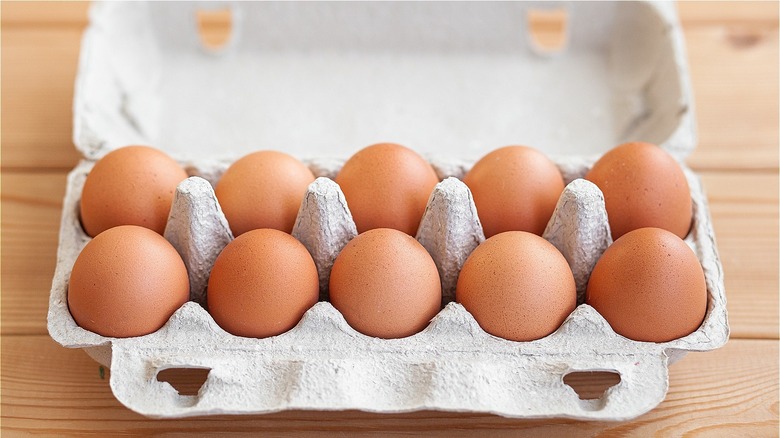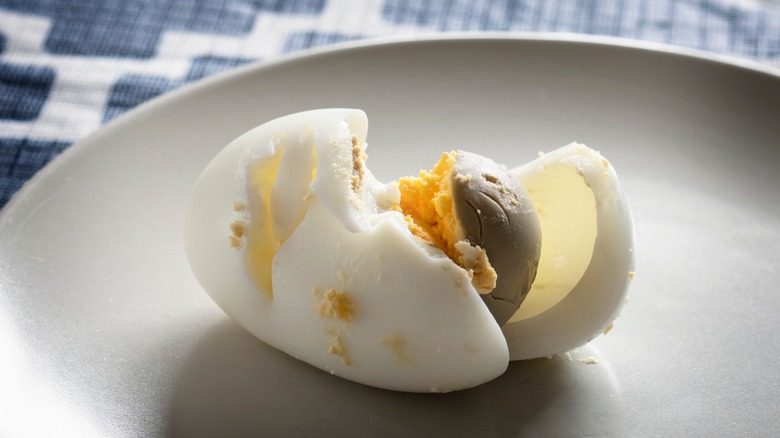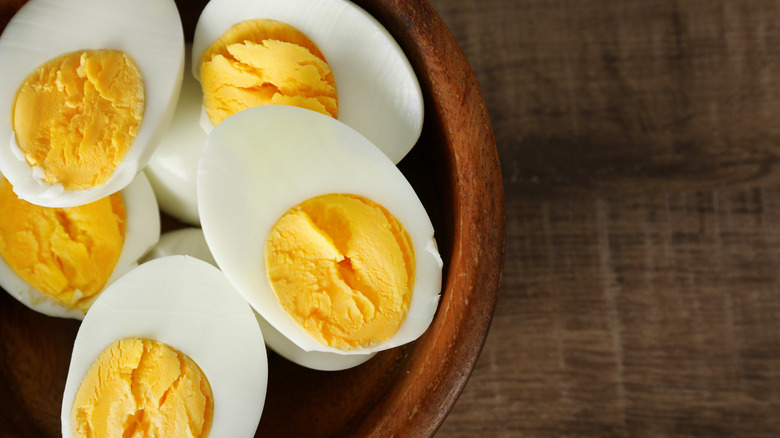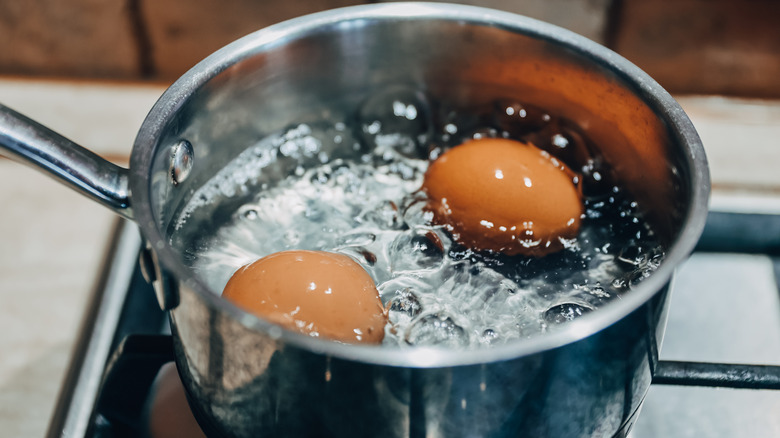Here's What Really Happens When You Overcook An Egg
We may never know whether the chicken or the egg came first — but should we care? Both are tasty, nutrient-dense, and can be prepared in many different ways.
In the U.S., poultry is the most popular type of meat; each American eats an average of more than 100 pounds of chicken each year, according to Vox. Eggs are also in high demand — Statista reports that in 2021, each American ate an average of 284.6 eggs. And the U.S. produces about 75 billion eggs annually, per the American Egg Board.
Each large egg contains about 6 grams of protein, along with vitamin D and choline, per The American Heart Association. (That's why eggs are called the "perfect protein.") And just think about the delicious egg-based dishes that can be found throughout the world: New York's eggs Benedict, Mexican huevos rancheros, Italian frittatas, or the Japanese rolled omelet, tamagoyaki, per Taste Atlas. However, if you overcook your eggs, you might ruin all of these delicious dishes.
Overcooking eggs can lead to a rotten smell
Boiling eggs makes both the egg whites and yolks solidify and gets rid of any lingering bacteria, such as salmonella, during the process. Overcooked hard-boiled eggs, however, may contain iron sulfide, which leads to that telltale green hue. The sulfur in the egg white reacts with the yolk's iron, turning them green and forming iron sulfide, per The New York Times. As Gizmodo explains, hydrogen sulfide forms in the egg whites and then moves inward toward the egg yolk; the more green that's on your egg yolks, the more iron sulfide there is.
Still, it's not dangerous to eat a green egg yolk, per se (and there aren't any recorded cases of overcooked hard-boiled eggs harming anyone). In fact, the Egg Safety Center notes that "egg appearance is not usually related to food safety." But an overcooked hard-boiled egg won't be the tastiest or best-smelling option, either.
There are three main things to look for if you want to know when hard-boiled eggs are overcooked: The yolks are green, the eggs smell like sulfur, and they have a rubbery texture. (However, eating undercooked eggs can also be dangerous, as they can contain salmonella.)
How to hard-boil eggs — the right way
Although the exact time for cooking hard-boiled eggs isn't set in stone, it's generally recommended to boil eggs for 12 minutes and then let them rest in hot water for a further 15 minutes. Giving your hard-boiled eggs an ice bath can help prevent them from overcooking, suggests Forrest Green Farm. In addition to keeping the eggs from overcooking, the ice bath should make them easier to peel.
And if you want to know whether an egg is raw or hard-boiled, just roll it — a hard-boiled one will spin easily, while a raw one will wobble due to shifting liquids in the shell, per PA Eats.
Still curious about what happens if you keep the hard-boiling process going way beyond those recommended 12 to 15 minutes? Well, the YouTubers behind "Yes Yes Cooking" decided to boil an egg for 10 straight hours. The result was a very, very green egg white, and the yolk had a dark green shade on the exterior. The comments on the 2017 video were mostly positive, although many viewers wondered whether or not those 10-hour hard-boiled eggs were okay to eat.
You can still make use of overcooked eggs
Per Asian Recipe, there are ways you can still use overcooked hard-boiled eggs (provided they're simply discolored and not actually spoiled, of course). You can mash them with vegetables and mayonnaise and make an egg salad recipe; make deviled eggs by cutting them in half and filling them with a paste of mayonnaise, mustard, and egg yolks; or use the overcooked eggs as a topping for a salad with chicken and lettuce.
Still, it's worth noting, per Healthline, that overcooked eggs may lose some of their nutrients, such as iron and protein. "The longer and hotter you cook your eggs, the more nutrients you may lose," the outlet explains. Healthline also notes that certain cooking methods, including pan-frying, could lead to a finished dish with higher cholesterol content. So if that's something you're concerned about when eating eggs, take care not to keep them on the stovetop for too long.
While they're most likely safe to eat, overcooked eggs may not have as much nutritional value as their properly cooked counterparts; your best bet is to cook your eggs properly in the first place.



